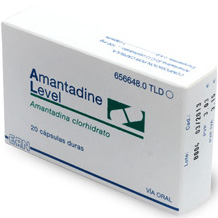Amantadine is a medication that belongs to the class of drugs known as antivirals. It is primarily used for the treatment of influenza A virus and some respiratory tract infections caused by other viruses. It may also be prescribed to manage the symptoms of Parkinson’s disease, as it helps to improve muscle control and reduce tremors. Amantadine works by preventing the growth and reproduction of certain viruses in the body, helping to alleviate symptoms and promote recovery.
When Not to Take Amantadine
Amantadine should not be taken under certain circumstances. You should not take this medication if you have a known allergy or hypersensitivity to amantadine or any of its components. It is also contraindicated for individuals with epilepsy or any history of seizures, as it may lower the seizure threshold. Additionally, if you have severe kidney disease or are currently taking a live attenuated influenza vaccine, amantadine should be avoided.
What to Expect When Taking Amantadine
As with any medication, there are potential side effects to be aware of when taking amantadine. Common side effects include dizziness, headache, insomnia, nausea, and dry mouth. These side effects are generally mild and go away on their own as your body adjusts to the medication. However, if they persist or become bothersome, it is important to consult your healthcare provider. Less common but more serious side effects may include confusion, hallucinations, difficulty urinating, or swelling of the hands or feet. If you experience any of these, seek medical attention immediately.
Dosage Guide
The dosage of amantadine will vary depending on the condition being treated, as well as individual factors such as age, weight, and overall health. It is important to follow the instructions provided by your healthcare provider or as indicated on the prescription label. Typically, for the treatment of influenza, the recommended dose is 200 mg once daily for up to 5 days. For Parkinson’s disease, the initial recommended dose is 100 mg once daily, which may be gradually increased if needed. If you miss a dose, take it as soon as you remember. However, if it is almost time for your next dose, skip the missed dose and continue with your regular dosing schedule. It is important not to double up on doses to make up for a missed dose. In case of overdose, it is crucial to seek immediate medical attention. Symptoms of overdose may include severe dizziness, fainting, hallucinations, seizures, and difficulty breathing.
How Other Drugs Affect Amantadine
Amantadine can interact with other drugs, potentially leading to adverse effects or reducing the effectiveness of either medication. It is important to inform your healthcare provider about all the medications you are currently taking, including over-the-counter drugs, herbal supplements, and vitamins. Some drugs that may interact with amantadine include anticholinergic medications, such as benztropine, trihexyphenidyl, or scopolamine. These interactions may lead to increased side effects, such as dry mouth, blurred vision, or constipation. Additionally, drugs that affect the pH of the urine, such as carbonic anhydrase inhibitors, may alter the elimination of amantadine from the body. Your healthcare provider will be able to determine the appropriate dosage or adjust your medication regimen accordingly.
Inquiring About Amantadine
- Can I take amantadine with other antiviral medications? It is best to consult your healthcare provider before combining amantadine with other antiviral medications, as there may be interactions or overlapping effects.
- Can amantadine be taken during pregnancy or while breastfeeding? The use of amantadine during pregnancy or breastfeeding should be discussed with your healthcare provider, as the potential risks and benefits need to be carefully evaluated.
- How long does it take for amantadine to start working? The onset of action may vary depending on the condition being treated. For influenza, relief of symptoms typically occurs within 48 hours of starting treatment.
- Can I stop taking amantadine once my symptoms improve? It is important to complete the full course of treatment as prescribed by your healthcare provider, even if your symptoms improve. Stopping the medication prematurely may result in the recurrence of symptoms or the development of resistant viruses.
- Are there any special precautions or dietary restrictions while taking amantadine? Your healthcare provider will advise you on any specific precautions or dietary restrictions, as certain foods or activities may interact with amantadine or affect its absorption.






Reviews
There are no reviews yet.